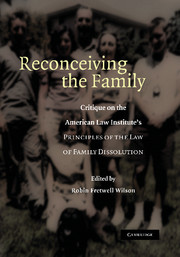 Reconceiving the Family
Reconceiving the Family Book contents
- Frontmatter
- Contents
- Acknowledgments
- Foreword, by Mary Ann Glendon
- List of Contributors
- Introduction
- PART ONE FAULT
- PART TWO CUSTODY
- PART THREE CHILD SUPPORT
- PART FOUR PROPERTY DIVISION
- PART FIVE SPOUSAL SUPPORT
- PART SIX DOMESTIC PARTNERSHIP
- 14 Domestic Partnership and Default Rules
- 15 Private Ordering under the ALI PRINCIPLES: As Natural as Status
- 16 Marriage Matters: What's Wrong with the ALI's Domestic Partnership Proposal
- 17 Domestic Partnerships, Implied Contracts, and Law Reform
- PART SEVEN AGREEMENTS
- PART EIGHT JUDICIAL AND LEGISLATIVE PERSPECTIVES
- PART NINE INTERNATIONAL REFLECTIONS
- Afterword: Elite Principles: The ALI Proposals and the Politics of Law Reform, by Carl E. Schneider
- Index
17 - Domestic Partnerships, Implied Contracts, and Law Reform
Published online by Cambridge University Press: 25 January 2010
- Frontmatter
- Contents
- Acknowledgments
- Foreword, by Mary Ann Glendon
- List of Contributors
- Introduction
- PART ONE FAULT
- PART TWO CUSTODY
- PART THREE CHILD SUPPORT
- PART FOUR PROPERTY DIVISION
- PART FIVE SPOUSAL SUPPORT
- PART SIX DOMESTIC PARTNERSHIP
- 14 Domestic Partnership and Default Rules
- 15 Private Ordering under the ALI PRINCIPLES: As Natural as Status
- 16 Marriage Matters: What's Wrong with the ALI's Domestic Partnership Proposal
- 17 Domestic Partnerships, Implied Contracts, and Law Reform
- PART SEVEN AGREEMENTS
- PART EIGHT JUDICIAL AND LEGISLATIVE PERSPECTIVES
- PART NINE INTERNATIONAL REFLECTIONS
- Afterword: Elite Principles: The ALI Proposals and the Politics of Law Reform, by Carl E. Schneider
- Index
Summary
The domestic partnership chapter of the Principles is the shortest chapter, but, as the contributions to this volume suggest, among the most interesting to many people. The legal regulation of informal intimate unions generally and particularly the Principles' approach of creating a status that carries the legal rights and obligations of marriage between cohabiting parties have generated considerable debate. In some quarters, the domestic partnership provisions are admired as an effective mechanism to protect dependent partners in marriage-like unions who otherwise may be unable to establish claims to property and support when their relationships end. Others praise the Principles for acknowledging the diversity of contemporary families and legitimizing a nonmarital family form for both same-sex and opposite-sex couples. Some critics of the Principles oppose domestic partnership status for exactly this reason, arguing that the legal recognition of informal intimate unions – including same-sex unions – undermines traditional marriage, and that this is bad. Others object on practical grounds that the Principles will generate a flood of litigation because of the complexity of the proposed legal standard and the need to establish domestic partnership status before a claim is considered.
This chapter also expresses skepticism about the domestic partnership provisions, but for reasons that differ from those of most critics. The goal of providing partners in long-term unions with more effective means of enforcing financial obligations between themselves is laudable, as is the Principles' inclusion of same-sex as well as opposite-sex unions.
- Type
- Chapter
- Information
- Reconceiving the FamilyCritique on the American Law Institute's Principles of the Law of Family Dissolution, pp. 331 - 350Publisher: Cambridge University PressPrint publication year: 2006


